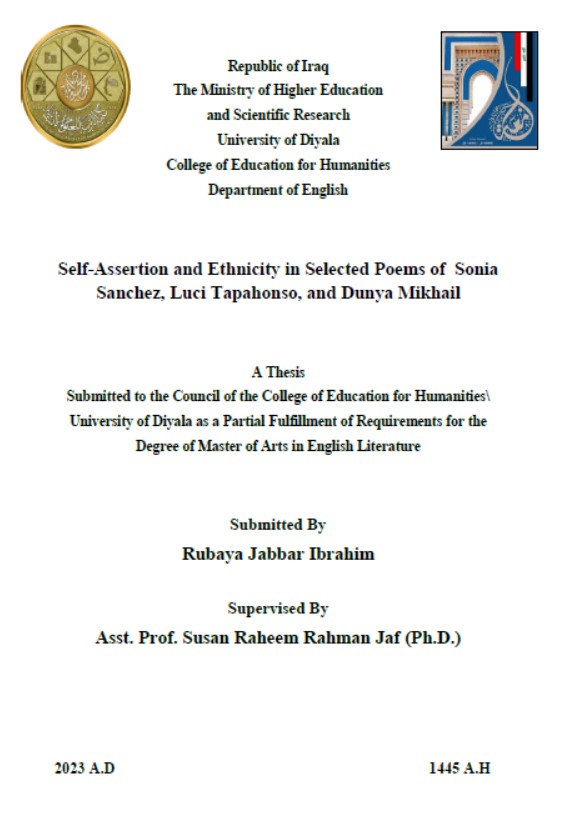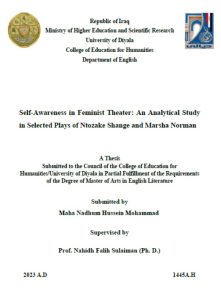Abstract
This thesis delves into the exploration of ethnic self-assertion within the poetry of Sonia Sanchez, Luci Tapahonso, and Dunya Mikhail, employing the framework of Social Identity Theory. The study investigates how these esteemed American poets, each representing distinct cultural backgrounds, negotiate and articulate their ethnic identities in their poetic works. Through an analysis of selected poems, the research examines the evolution of the self-assertion concept as a strategic approach to reclaiming cultural heritage and affirming individuality within their respective ethnic groups.
The study addresses the critical issue of how these poets grapple with the multifaceted challenges embedded in their ethnic backgrounds, marked by histories of colonization, displacement, and cultural erasure. The dynamics of self-assertion are unraveled among individuals from diverse ethnic backgrounds, as well as the challenges faced these poets in expressing their individuality within various American societal contexts. Beyond poetic analysis, the study aims to elucidate the roots of the social identity perspective, differentiate between personal and social identity, and clarify key concepts such as social identity, depersonalization, prototype, and positive distinctiveness.
The thesis is divided into five chapters. The first gives a theoretical overview of ethnicity and self-assertion within Tajfel and Turner’s Social Identity Theory. This chapter explores how self-categorization, social identification, and social comparison processes help people locate their social and psychological position in the world. The thesis offers the groundwork for understanding how people manifest their ethnic identities in the setting of various social groupings and societal standards by examining these ideas.
In the second chapter, the themes of racial identity and social justice, are heavily presented in Sonia Sanchez’s poems. In addition to making a strong case for black unity and resistance to systemic injustice and slavery, she explores how their voices in the poems categorize themselves and others based on their ethnic backgrounds and cultural affiliations. She builds a path of self-assertion that is rooted in a rich cultural history by empowering her community and amplifying the voices of those who have historically been marginalized through her expressive verse.
| x |
The third chapter touches upon the aspect of social comparison as she navigates Native’s ethnic identities within larger societal contexts. Luci Tapahonso’s poetry focuses on the rich history and current struggles of Native Americans in the United States. While highlighting the beauty and resiliency of her culture, Tapahonso frequently explores the historical trauma of colonization and its effects on Native American quality. Her poetry destroys illusions and prevailing narratives, reaffirming her Navajo identity. She achieves this through a poignant deconstruction of established illusions and narratives in her poetic expressions, offering alternative perspectives that defy conventional understanding. Native Americans are striving to present a more nuanced and authentic representation of their cultures and prove that they are the real owners of the land.
The forth chapter tackles Iraqi-American poet, Dunya Mikhail. She uses her experiences as an exiled poet to explore issues of self-affirmation and ethnicity with a sense of social identification with her ethnic groups. In the face of conflict, she frequently captures the trauma and determination of her fellow Iraqis, particularly women. Mikhail gives voice to the voiceless with vibrant visuals and stirring anecdotes, claiming her own Arab identity and emphasizing the value of her cultural heritage.
The fifth chapter suggests that the findings and revelations gleaned from the analysis of the previous chapters should guide future research and policy endeavors. Additionally, it promotes the inclusion of many voices and theories in
| XI |
the development of inclusive policies and practices that enable people to establish their ethnic identities and foster social cohesiveness. It is believed that by utilizing the research findings, beneficial adjustments may be implemented to build a more just and peaceful society for everyone.





